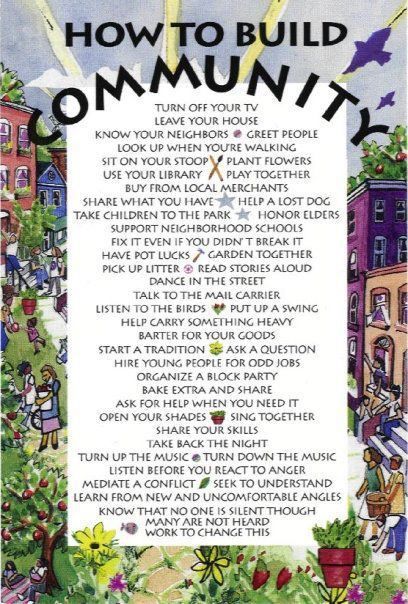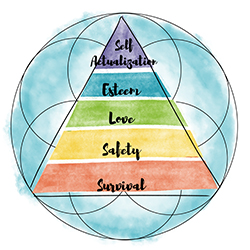Love
Belonging, Community, and Relationships
In Maslow's Hierarchy of Needs, the "Love and Belongingness" tier represents the human need for social connection, relationships, and a sense of belonging.
Core-concepts
Tier 3
Once physiological and safety needs are met, people seek social connections, affection, and a sense of belonging:
- Friendship: Forming meaningful relationships and friendships.
- Intimacy: Establishing close, loving relationships.
- Family: Connection with family members.
- Community: Feeling a part of a larger social group.
This tier emphasizes the importance of love, both in terms of giving and receiving, as a fundamental requirement for psychological well-being. It includes aspects like family, friendships, intimacy, and a sense of community. Meeting these needs leads to feelings of acceptance, support, and the development of meaningful relationships, which contribute to emotional fulfillment and a sense of purpose in life.
"Everything worth having costs something, and the price of true love is self-knowledge." -Unknown
Love and Belonging Needs
 Questions
Questions
- Do I have fulfilling relationships with family, friends, and community?
- Do I feel accepted and valued by others?
- How can I cultivate deeper connections and a sense of belonging in my social circles?
Write the ways you practice and fulfill your love and belonging needs.
Login to view.

Resources
Self Love
 Practice
Practice
- Self-Appreciation: Embrace self-love by acknowledging your positive qualities, accomplishments, and strengths.
- Self-Care: Prioritize self-care routines that promote physical, mental, and emotional well-being.
- Positive Affirmations: Repeat affirmations such as "I love myself because I am..." and "I love the way I..." to reinforce self-love.
- Self-Improvement: Continuously work on becoming the best version of yourself, setting personal growth goals, and celebrating your progress.
- Leadership Skills: Build leadership skills to lead yourself with confidence and determination.
- Emotional Intelligence: Enhance emotional intelligence to better understand and manage your own emotions and relationships.
- Distinguish Emotions: Learn to differentiate between fear-based and love-based emotions to make healthier choices.
Relationships
I love you the way I love myself.
In a relationship, you have control over two fundamental aspects:
- Self-Presentation: This includes the way you present yourself, your actions, and your words.
- Reactions: You also have control over how you react to the words and actions of the other person.
Improving your relationships primarily involves self-improvement. When you focus on becoming the purest version of yourself, you are more likely to attract the right people into your life at the right time.
 Practice
Practice
Expressing Love
- Clear Communication: Ensure that you express your love and feelings clearly to others, whether through words, actions, or gestures.
- Acts of Kindness: Show love through acts of kindness, whether it's lending a helping hand or offering support to loved ones.
- Quality Time: Spend quality time with loved ones to strengthen bonds and connections.
- Gifts and Surprises: Consider thoughtful gifts or surprises as tokens of your affection.
- Verbal Affirmations: Use verbal expressions of love, such as saying "I love you" or complimenting others sincerely.
Receiving Love
- Acceptance: Allow yourself to receive love by accepting compliments, help, and affection from others graciously.
- Vulnerability: Be open and vulnerable with trusted individuals, allowing them to express their love and support.
- Gratitude: Practice gratitude by acknowledging and appreciating the love that comes your way.
- Self-Worth: Recognize your own worthiness of love and positive relationships.
By taking these actions, you can cultivate a deeper sense of self-love, improve your ability to express love, and become more receptive to love from others. This contributes to healthier relationships and a greater overall sense of well-being.
Community
Feeling like you belong somewhere brings about more love into your life. The more love you give to yourself, the more you can love others, the more others love you.
 Question
Question
- Where do I feel like I belong?
- What do I enjoy doing that I could do with others?
- How can I give a little bit of myself to the community?
- How can I make wherever I am little bit better?
 Actions
Actions
-
Identify Your Interests: Determine your interests, skills, passions, and hobbies. Building a community around activities you love ensures a shared sense of purpose.
-
Networking: Attend events, workshops, or classes related to your interests. This allows you to meet like-minded individuals.
-
Online Communities: Explore online forums, social media groups, and platforms related to your interests. These spaces often host discussions, sharing of experiences, and networking opportunities.
-
Local Clubs and Groups: Investigate local clubs, organizations, or groups that align with your interests. Many communities have clubs for hobbies, sports, or charitable activities.
-
Volunteer: Engage in volunteer work for causes you care about. Volunteering connects you with individuals who share your values and commitment to making a positive impact.
-
Attend Meetups: Join local meetup groups or create your own. Meetups provide opportunities for socializing, learning, and pursuing common interests.
-
Be Active in Existing Communities: If you are already part of a community, be an active and supportive member. Offer your expertise, help others, and participate in group activities.
-
Host Events: Organize events or gatherings related to your interests. Hosting allows you to bring people together and create a sense of community.
-
Communication: Foster open and meaningful communication within your community. Encourage sharing of ideas, experiences, and support.
-
Consistency: Building a community takes time and consistency. Attend events regularly, participate in discussions, and maintain connections with fellow community members.
-
Inclusivity: Ensure your community is inclusive and welcoming to individuals from diverse backgrounds and perspectives.






 Questions
Questions Practice
Practice